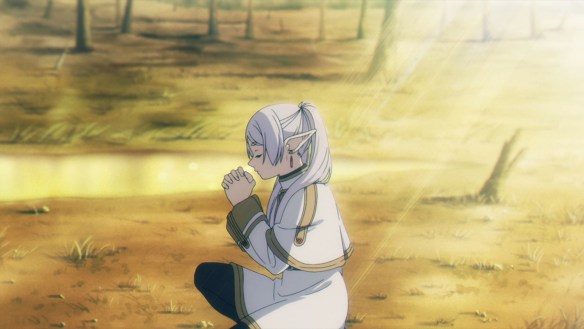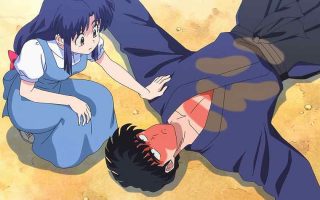Hello folks, and welcome back to Wrong Every Time. Today I’m eager to return to the wandering journeys of Frieren and her companions, in the wake of their victory over Aura the Guillotine and her executioners. Though this arc was ostensibly an articulation of demonkind’s incompatibility with human society, our last episode demonstrated that it was more specifically about Frieren’s soft-spoken hatred for demons, the experiences that led her to see them as incapable of compassion or emotion. In her attempts to define monsters, Frieren only demonstrated how her own life has led her to be so quick to assign that label.
It is now much easier to see how Frieren has drifted through life while acquiring so few emotional attachments. A conventional social structure was stolen from her as a child, while her replacement “family” Flamme taught her only to pursue power and cultivate ruthlessness. Even Flamme ended up regretting her pragmatic bond with Frieren, relenting just in time to pass on the field of flowers spell that connected her with her own parents. Given her own insistence on adorning Himmel’s monument with flowers, it’s clear that lesson stuck – but otherwise, Frieren’s lessons and temperament reveal she is precisely the weapon Flamme made of her, no more or less.
As such, it is up to this current journey to teach her new lessons, to invite her to find love and sanctuary in others, even if such unions will inevitably pass. Every day with Fern and Stark demonstrates that time spent with valued companions is never time wasted – in fact, it is often the seemingly idle, shapeless days that stand most clearly in memory, typifying the spirit of mutual fondness that made your time together so special. Let’s see what fresh memories await as we return to Frieren!
Episode 11
We begin shortly after we left off, as the morning light illuminates Frieren’s battlefield. Frieren offers a prayer to the freed warriors Aura had manipulated; Fern expresses no emotion, having grown up with such scenes imprinted on her psyche. An odd pair to be the saviors of mankind, given both of them are so emotionally distant from most of humanity
The production once again demonstrates its emphasis on cohesive compositions and aesthetics, as all of the collapsed suits of armor are now painted as if part of the background, rather than realized through the CG models that their earlier mass movements necessitated. CG is useful for conveying mass group movements without necessitating a preposterous degree of animation, but it’s basically anathema to any attempts at cohesiveness or visual beauty. In a production that values its atmosphere and aesthetic as highly as Frieren, I appreciate the team’s understanding that leaning on more CG models would ruin the emotional impact of this moment
Really, the only thing CG genuinely excels at is “conveying a great deal of moving visual information quickly and efficiently.” I’d be happier if most productions that currently employ CG replaced their CG objects with either still images or cutting around the intended object – the more older anime I watch, the more it becomes clear that extremely limited motion is preferable to CG models
Love the color design here too. The hint of brown in these yellows and greens creates a strong autumnal effect, emphasizing the encroachment of winter
“Thank you for treating the heroes of the northern lands with respect.” So much of this series is about paying proper respect to those who have passed
“I used to cast flashier spells, but Himmel got mad at me.” “Mr. Himmel trained you well.” Fern’s light mockery illustrates a genuine truth: Flamme taught Frieren to be a mage, but Himmel was the one who taught her to be a person
Well, at least the one who set her down that road. Obviously I’m engaging in a bit of hyperbole, but we are all truly works in progress, hopefully building towards more self-assured and empathetic selves. Practically no one is naturally a great person; it is a goal we must aspire to in spite of our natural predilections towards selfishness, fearfulness, and contentment with a comfortable routine. We must work hard to make ourselves kinder, and to make the world itself kinder in turn
“Good job defeating Lugner and his henchwoman. I’m proud of you.” Said with a smile, Frieren actually relishing her connection to these two. She’s finally learning to respect what is most valuable in life in the moment, rather than only recognizing how much she cared in retrospect. To these two, she can offer the words she never shared with Himmel
And Granat at last reunites with his son
As reward, Frieren requests Flamme’s defensive barrier grimoire, but immediately recognizes it as a fake
Then there’s an extended gag regarding formality of speech that doesn’t really work. This show’s blunt yet lethargic style of dialogue doesn’t lend itself to banter; it’s more the sight gags or punchy anticlimaxes that land, like Frieren in her dang mimic chest
As ever, the incidental, essential texture of life is presented through montage: sharing a victory dinner with your companions, helping with the repairs to the city walls, wandering and admiring this town that your labor defended. Life is not a series of dramatic narrative turns, it is an accumulation of potentially forgettable days, made meaningful by the companions you choose to share them with. Moments are brief but memories are forever, so you’d best make the brightest ones you can
The insert song swells as one of those rare perfect moments arrives, and the team enjoy the splendor of the northern lights. Gosh, this show is such a triumph of aesthetic cohesion – music, sound design, animation, background art, and direction all work in such marvelous coordination
And just how it feels in real life, in the blink of an eye, their time here is over. I don’t think I’ve ever seen a show employ montage to such consistent, thematically resonant effect
The town they’re seeking is Ende, the northernmost village. Roughly as on-the-nose as this production’s other titles; names and worldbuilding more generally are clearly not Kanehito Yamada’s strong suit. Frankly, I’m not really a worldbuilding-first sort of person myself, but creating a world that feels both alluring and full conceived will always enhance the solidity of your drama, while also giving audiences who do care about worldbuilding something to dig into. To say nothing of how worldbuilding and themes are often naturally intertwined
We learn from Granat that travel on the Northern Plateau is limited to those traveling with a first class mage
“The organizations that regulate mages are constantly changing. I can’t be bothered obtaining a new certification every time.” Of all of Frieren’s long-lived mannerisms, this feels like one of the most relatable
The Continental Mage Association has apparently been regulating magic for at least half a century
Our party thus heads off to Auberst, where Frieren can apparently take her certification exam. So I assume this will be the equivalent of some sort of tournament arc? That doesn’t really feel in line with Frieren’s dramatic strengths, but I imagine the fights will at least be sumptuously animated
The first fall of snow is accompanied by cutting the music and deafening the general environmental sounds, an excellent way of creating that muffled winter atmosphere
In the war against the Demon Lord, it was actually the northern winters that took the most lives. A frank reflection on the true nature of war, which feels particularly appropriate for Frieren – even war is not defined by the dramatic battles, but by the countless days in between, huddling for warmth in a foreign land
The heavy snowfall of the north swiftly leaves our party lost in the flurry. They take shelter in a small cabin with another elf
“It’s been about 300 years since I’ve met another of my kind. I thought the elves had already died out.” It seems elves living isolated lives is not unusual in this world. Also a pretty common conceit to imagine elves as denizens of a prior age defined by rampant magic and mystery, who are now disappearing from the earth. This was true of Tolkien’s elves, but the concept greatly predates his work; I assume it actually ties back to elves’ association with pre-Christian religions, fitting into the generally disappearance of pagan faith and its creations from the earth
He introduces himself as Kraft the Monk. Definitely a little odd how characters tend to fit themselves into predetermined combat classes in this world; childhoods full of Dragon Quest appear to have had a lasting deleterious effect on the fantastical imaginations of anime-adjacent writers. This is still certainly a lot better than isekais with actual leveling and skill descriptions, at least, but no gamified world feels particularly real
I like this beat where Stark’s surprise at waking up next to Kraft is immediately replaced with admiration for his excellent training regimen
Given the state of the mountain pass, they elect to stay here for a while. Another frequently handwaved element of adventuring: just sitting around waiting for weather conditions to improve
“She’s the mage from the party of heroes.” “And before that?” Elves live too long to only be one thing, one title or era
Time again passes in montage: lessons learned, meals shared, days of staring out and waiting for the snow to pass
When asked why he believes in the Goddess, Kraft says he “needs her to exist. Everyone who knew of my righteous triumphs has died. So when I die, I’ll go to heaven and the goddess will praise me.” On a long enough time frame, only faith can offer a companion who’ll be with you for the whole journey
“It’s too cruel for the path your life took to not be remembered by anyone.”
“That’s just something we desire.” True. All deeply considered faith is aspirational – that’s why we call it faith. Believing in gods that obviously do exist is just pragmatism, no hope required
Kraft and Heiter alike cherish the thought of the Goddess waiting to praise them for their deeds – but if their friends don’t believe in the Goddess, they will happily take that role themselves
And Done
Thus Kraft travels on his way, having lightly touched the lives of our three wanderers during the brief months they shared. Their ambiguous and all-too-short connection feels perfectly of a piece with Frieren’s thematic ambitions, demonstrating the wandering and randomly intersecting nature of our lives, and insisting that what meaning exists in these meetings and partings is the meaning we bring to them. So it goes for Kraft’s relationship with the Goddess – his faith is meaningful because he finds purpose and hope within it, knowing that even as his trusted companions pass into memory, there is still a friendly face waiting somewhere up the road. I suppose that’s all that any of us can really hope for.
This article was made possible by reader support. Thank you all for all that you do.




